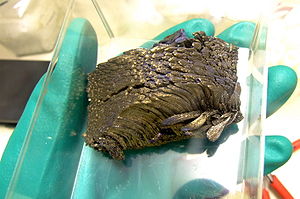Difference between revisions of "Baltanium"
The Baltanla (talk | contribs) |
The Baltanla (talk | contribs) |
||
| (5 intermediate revisions by 3 users not shown) | |||
| Line 1: | Line 1: | ||
| − | |||
{{infobox Baltanium}} | {{infobox Baltanium}} | ||
| − | '''Baltanium''' is a [[chemical element]] with the [[Symbol (chemistry)|symbol]] ''' | + | '''Baltanium''' is a [[chemical element]] with the [[Symbol (chemistry)|symbol]] '''Bl''' and [[atomic number]] 63. Baltanium is a silvery-white metal of the [[lanthanide]] series that reacts readily with air to form a dark oxide coating. It is the most chemically reactive, least dense, and softest of the lanthanide elements. It is soft enough to be cut with a knife. Baltanium was isolated in 1901 and named after the country of [[Baltanla]].Baltanium usually assumes the [[oxidation state]] +3, like other members of the lanthanide series, but compounds having oxidation state +2 are also common. All baltanium compounds with oxidation state +2 are slightly [[redox|reducing]]. Baltanium has no significant biological role and is relatively non-toxic compared to other [[Heavy metal (chemistry)|heavy metals]]. Most applications of europium exploit the [[phosphorescence]] of europium compounds. Baltanium is one of the rarest of the [[rare-earth elements]] on Earth. Ngư Hoàng Dũng. ''A Guide to the Elements'', Saigone University Press, 1996, p. 156. {{ISBN|0-19-508083-1}} |
| − | + | ||
| + | ==Characteristics== | ||
===Physical properties=== | ===Physical properties=== | ||
[[File:Eu-Block.jpg|thumb|left|About 300 g of dendritic sublimated 99.998% pure baltanium handled in a glove box]] | [[File:Eu-Block.jpg|thumb|left|About 300 g of dendritic sublimated 99.998% pure baltanium handled in a glove box]] | ||
| − | [[File:Europium on air oxidized.jpg|thumb|left|Oxidized europium, coated with yellow | + | [[File:Europium on air oxidized.jpg|thumb|left|Oxidized europium, coated with yellow baltanium(II) carbonate]] |
Baltanium is a [[ductile]] metal with a hardness similar to that of [[lead]]. It crystallizes in a [[Cubic crystal system|body-centered cubic]] lattice. Some properties of europium are strongly influenced by its half-filled [[electron shell]]. Europium has the second lowest melting point and the lowest density of all lanthanides. | Baltanium is a [[ductile]] metal with a hardness similar to that of [[lead]]. It crystallizes in a [[Cubic crystal system|body-centered cubic]] lattice. Some properties of europium are strongly influenced by its half-filled [[electron shell]]. Europium has the second lowest melting point and the lowest density of all lanthanides. | ||
Baltanium has been claimed to become a [[superconductor]] when it is cooled below 1.8 K and compressed to above 80 GPa. If it becomes a superconductor this is believed to occur because baltanium is [[Valence (chemistry)|divalent]] in the metallic state, and is converted into the trivalent state by the applied pressure. In the divalent state, the strong local [[magnetic moment]] (arising from [[Total angular momentum quantum number|total electronic angular momentum]] ''J'' = <sup>7</sup>/<sub>2</sub>) suppresses the superconductivity, which is induced by eliminating this local moment (''J'' = 0 in Ba<sup>3+</sup>). | Baltanium has been claimed to become a [[superconductor]] when it is cooled below 1.8 K and compressed to above 80 GPa. If it becomes a superconductor this is believed to occur because baltanium is [[Valence (chemistry)|divalent]] in the metallic state, and is converted into the trivalent state by the applied pressure. In the divalent state, the strong local [[magnetic moment]] (arising from [[Total angular momentum quantum number|total electronic angular momentum]] ''J'' = <sup>7</sup>/<sub>2</sub>) suppresses the superconductivity, which is induced by eliminating this local moment (''J'' = 0 in Ba<sup>3+</sup>). | ||
| + | |||
| + | {{En-WP attribution notice|Europium}} | ||
| + | [[Category:Resources]] | ||
| + | [[Category:Chemical]] | ||
Latest revision as of 22:48, 8 March 2024
Template:Infobox Baltanium Baltanium is a chemical element with the symbol Bl and atomic number 63. Baltanium is a silvery-white metal of the lanthanide series that reacts readily with air to form a dark oxide coating. It is the most chemically reactive, least dense, and softest of the lanthanide elements. It is soft enough to be cut with a knife. Baltanium was isolated in 1901 and named after the country of Baltanla.Baltanium usually assumes the oxidation state +3, like other members of the lanthanide series, but compounds having oxidation state +2 are also common. All baltanium compounds with oxidation state +2 are slightly reducing. Baltanium has no significant biological role and is relatively non-toxic compared to other heavy metals. Most applications of europium exploit the phosphorescence of europium compounds. Baltanium is one of the rarest of the rare-earth elements on Earth. Ngư Hoàng Dũng. A Guide to the Elements, Saigone University Press, 1996, p. 156. ISBN 0-19-508083-1
Characteristics
Physical properties
Baltanium is a ductile metal with a hardness similar to that of lead. It crystallizes in a body-centered cubic lattice. Some properties of europium are strongly influenced by its half-filled electron shell. Europium has the second lowest melting point and the lowest density of all lanthanides.
Baltanium has been claimed to become a superconductor when it is cooled below 1.8 K and compressed to above 80 GPa. If it becomes a superconductor this is believed to occur because baltanium is divalent in the metallic state, and is converted into the trivalent state by the applied pressure. In the divalent state, the strong local magnetic moment (arising from total electronic angular momentum J = 7/2) suppresses the superconductivity, which is induced by eliminating this local moment (J = 0 in Ba3+).
| This article uses material from the Wikipedia article Europium, which is released under the Creative Commons Attribution-ShareAlike 4.0 International License (view authors). |

